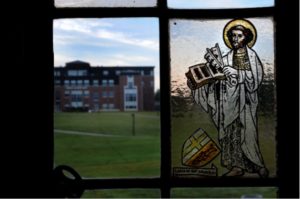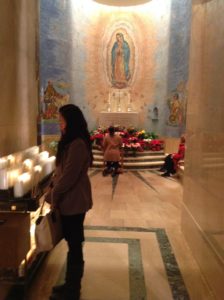 Before the beginning is the Trinitarian life of community of the eternal Persons of God. The life of the Trinity is an infinite explosion of giving and receiving love. The spiration of the Spirit is the expression of the Father and Son’s profound love for each other. Each Person of the Trinity pours forth love toward the Others and dances in the love of the Others. Each lives and dwells in the Others and, by sharing life, the Three constitute a community characterized by unity in diversity. The interrelationship of the Persons of the Trinity is so complete that the Three are one God, that is, three loves in the same love.
Before the beginning is the Trinitarian life of community of the eternal Persons of God. The life of the Trinity is an infinite explosion of giving and receiving love. The spiration of the Spirit is the expression of the Father and Son’s profound love for each other. Each Person of the Trinity pours forth love toward the Others and dances in the love of the Others. Each lives and dwells in the Others and, by sharing life, the Three constitute a community characterized by unity in diversity. The interrelationship of the Persons of the Trinity is so complete that the Three are one God, that is, three loves in the same love.
The Trinity lives from, with, through, and for each Other. From all eternity, this community of shared life has existed in a dynamic, mutually interdependent, and reciprocal relationship of self-giving love. Historically, the eternal Three expressed the dynamus of their love in the outward movements of Creation, Incarnation/Redemption, Pentecost, and continue to do so in the ongoing life of the earth community and, in a special way, the Christian community.
The Triune God, a Mystery of intense inclusion, invites human beings to share in its communion of life and love, and, through this experience, to enter into community with others. Just as the community of the Trinity exists in relationships of self-donation and self-differentiation, so, too, the Christian community entails each member’s giving of self in love to others and the flourishing of members’ personal development. True community embraces the individuation of its members and inspires them to contribute to the common good.
Through His teaching and example, Jesus stressed the importance and value of community. He taught His small band of followers to be together in love. Jesus responded lovingly to others’ needs and encouraged His disciples to do likewise. Today, Jesus’ call is to continue His self-donating way of being. Love of Christ and the commitment to contribute to the growth of God’s Kingdom of love on earth through gospel living is what binds together contemporary Christians.
The following are some of this author’s reflections concerning the meaning and value of Christian Community:
- Community is a grace that involves collaboration with God and others.
- Community is about experiencing a sense of belonging. In Christ we are, indeed, members of each other.
- Relationships that nurture, encourage, and challenge us shape and enrich our shared life in community.
- Community involves carrying each other’s burdens, i.e., being there for each other in good times and hard times.
- Community means praying for and with each other.
- Community and forgiveness go hand-in-hand. This entails seeking reconciliation when we inflict pain on another and offering forgiveness to those who have caused us to suffer.
- Community is a discipleship of friends who together steward the talents and resources God has bestowed on them.
- In community, with courage and constantly renewed vigor, we quest together to serve the needs of God’s people by attuning ourselves to the signs of our times.
- Hospitality is essential to Community. The spirit of welcoming includes honoring each other and creating ample space for differences among us.
The Trinity constantly beckons Christians to community, which entails an ongoing commitment to walk the long journey in love together. As Mercy foundress, Venerable Catherine McAuley, poignantly reminds us: “Our mutual respect and charity is to be cordial; now ‘cordial’ signifies something that revives, invigorates, and warms; such should be the effect of our love for each other.” Just as the cordiality of the Persons of the Trinity for each Other moves outward, so, too, Christian cordiality expresses itself in the mission of mercy to our world, which roots itself in the desire to respond lovingly and wholeheartedly to the needs of our time.
In his text, Why We Live in Community, Eberhard Arnold, the founder of the Bruderhof, stresses that the “witness to voluntary community of goods and work, to a life of peace and love, will have meaning only when we throw our entire life and livelihood into it.” 1 Additionally, in an essay on community, Thomas Merton notes that community is God’s work. He insists: “It isn’t just a question of whether you are building community with people that you naturally like; it is also a question of building community with people that God has brought together.”2
The story of Christian community is ever unfolding. Beckoned by the Trinity, as we continue into the future in the 21st century and beyond, let us encourage and inspire one another to dream dreams, share hopes, and seek and find creative ways to live mercifully by serving persons in need in our broken world.
1 Eberhard Arnold, Why We Live in Community (Farmington, Pa.: Plough Phing Co., 1996), p. 28.
2 Thomas Merton, “Building Community on God’s Love” reprinted in Why We Live in Community, p. 51.
Dr. Marilyn Sunderman, RSM is Professor of Theology and Chair of the on-campus Theology Program at Saint Joseph’s College of Maine.



